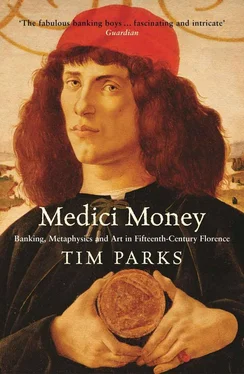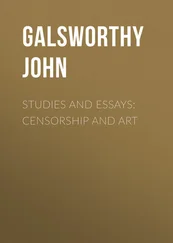And now the wars have begun again, the usual complicated mix of rebellion and opportunism. Pope Eugenius has fled an uprising in Rome and taken up residence in Florence. He needs his banker more than ever. He needs money to buy friends and pay mercenaries. The city of Bologna, part of the Papal States, likewise falls to rebels. The Venetians and Florentines form an alliance to put down the uprising. Milan wades in on the other side, and in the late summer of 1434, the Florentines are soundly defeated by the now-inevitable Piccinino near Imola. A disaster. Immediately afterward, to top it all, Rinaldo degli Albizzi commits the unpardonable error of allowing a pro-Medici group of priors to appear from the electoral bags. Why didn’t he rig the election? Cosimo is invited back. Rinaldo’s attempt at armed rebellion is headed off with pathetic ease by a few empty reassurances from Pope Eugenius. His only consolation a few days later when he himself is exiled will be a big told-you-so to the seventy other prominent men obliged to leave the city with him. Cosimo should have been killed: “Great men must either not be touched, or, if touched, eliminated.”
Taking over the reins of power, Cosimo at once exiles the dithering Palla Strozzi along with Rinaldo, thus demonstrating that to have money and not commit it politically is folly. Why else do big organizations give to political parties? In short, the banker is back, he is revered, he wields unconstitutional powers, and he hasn’t even broken the law. Such was and no doubt is the power of money. Historians choose to praise the bloodless nature of this transfer of power. “Yet it was tinged with blood in some part,” Machiavelli reminds us. Together with four other citizens, Antonio Guadagni, son of Bernardo (the gonfaloniere della giustizia who had accepted Cosimo’s bribe), left his designated place of exile to go to Venice. Given the city’s good relations with Cosimo, this was unwise. The five were arrested, sent to Florence, and beheaded.

Donatello’s David. The first we know of this extraordinary statue with its effeminate boy hero is its appearance in the courtyard of Palazzo Medici. There were those who accused Cosimo de’ Medici of approving of homosexuality .
4. “The Secret Things of Our Town”
He was accused of being friendly to sodomites. The first we know of Donatello’s David is in Cosimo’s house. It is hard to think of a better advertisement for homosexuality than this life-size naked youth in polished bronze who slays a giant to place a dainty foot on the severed head and assume an erotic pose. Hermaphroditus , a book of poems dedicated to Cosimo, was publicly burned. It promoted sodomy, said celebrity preacher Bernardino di Siena. But Cosimo never used his power to abolish the Officers of the Night, the vice police who prowled the piazzas in search of serving girls with too many buttons, perverse men in platform shoes, gay lovers caught in the unnatural act.
He was accused of being friendly to Jews. In 1437, the Florentine government conceded explicit moneylending licenses to Jews, not to Christians. But there is no indication that Cosimo opposed the law obliging Jews to wear a yellow circle of cloth. A Jew was not part of Christendom and that was that.
He was accused of usury and tax evasion. You will go to hell for benefiting from his evil earnings, Rinaldo degli Albizzi had told the Medici sympathizers. After his return to Florence, Cosimo lifted restrictions on the so-called dry exchanges. It was one of the few transactions that all the theologians agreed was usury.
He was accused of hijacking church renovation for his own glorification, of kicking out other would-be patrons, of replacing the family chapels of enemies with those of friends, of trying to buy his way into heaven, of using excommunication as a weapon to recover personal debts, of being too friendly with priests who are “the scum of the earth.”
He was accused of spending fabulous sums on a huge new palazzo while others starved, and of appropriating cash from the public purse to do it. “Who would not build magnificently being able to spend money which is not his?” his detractors complained. Blood was smeared on the massive doors of the new house. Designed by Michelozzo and situated on the via Largo, just a few hundred yards north of the duomo , the Palazzo Medici had, and still has, the forbidding look of the fortress about it. There were no windows at ground-floor level, just solid stone.
He was accused of cruelty and tyranny. He exiled so many and never failed to have the standard ten-year sentence extended before expiry. Families were split and letters censored. Up and down the peninsula, paid informers monitored the whereabouts of old enemies. Ingenious codes were developed to bemuse the city officials.
He was accused of using torture. Girolamo Machiavelli, along with two like minds, was “tormented for days before being exiled.” Re-arrested for failing to stay in his assigned place of exile, Girolamo died in prison “from illness or torture.”

Palazzo Medici, the house that Cosimo built. Inside, there are two spacious courtyards; outside, the palazzo could be defended against all comers .
He was accused of directing Florentine foreign policy for his own personal gain. In 1450, he switched the city’s support from the old ally Venice to the old enemy Milan, revolutionizing the system of alliances throughout Italy. Francesco Sforza, erstwhile condottiere , now duke of Milan, was one of the largest clients of the Medici bank.
He was accused of subverting and manipulating the democratic process, of rule by intimidation, of crushing all opposition to his authority, of running a narrow oligarchy, of shamefully elevating “base new men” who would always do his bidding. One Medici wool-factory foreman eventually became gonfaloniere della giustizia , head of the government.
He was accused above all — and this accusation contained and explained all the others — of seeking to become a prince , of attempting to transform Florence from a republic to a hereditary monarchy. Why else would a man build a house “by comparison with which the Roman Coliseum will appear to disadvantage”? Aging now, with the sagging cheeks and baggy eyes we see in all the paintings, Cosimo did not trouble to defend himself. He knew he was widely loved, by many adored. The popular poet Anselmo Calderoni addressed him thus:
Oh light of all earthly folk
Bright mirror of every merchant ,
True friend to all good works ,
Honour of famous Florentines ,
Kind help to all in need ,
Succour of orphans and widows ,
Strong shield of Tuscan borders!
Marco Parenti, son-in-law of the exiled Palla Strozzi, was implacably opposed to Cosimo and determined to bring his exiled in-laws back. On the banker’s death in 1464, however, he was obliged to remark on Cosimo’s modesty in deciding against a state funeral. He also acknowledged his enemy’s part in bringing peace and some prosperity to the city. People were grateful. “And nevertheless,” writes Parenti, “on his death everyone rejoiced; such is the love of and desire for liberty.”
Some time after the funeral, the government of the town chose to reward the dead Cosimo with the title of Pater Patriae , Father of His Country. Who is simultaneously loved and resented if not a father? However benevolently, the paternal figure holds us in check. Only the security he brings can reconcile us to waiting for his demise. Cosimo’s achievement was to make his Florentine family wait thirty years, and then some.
Читать дальше














